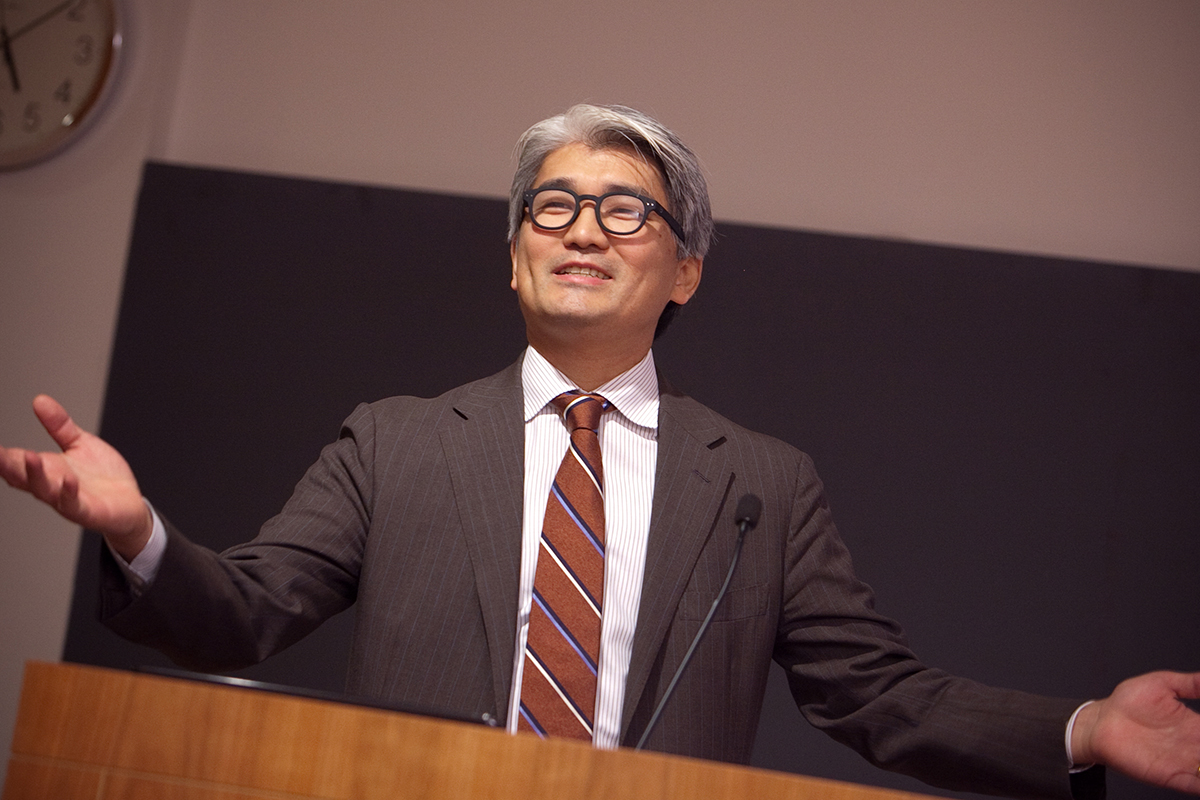Einaudi director on collaboration and crossing borders
By Joe Wilensky
Hirokazu Miyazaki, professor of anthropology and director of the Mario Einaudi Center for International Studies, is the program chair for this year’s Society for Cultural Anthropology biennial meeting at Cornell May 13-14. Miyazaki spoke to the Chronicle about the conference, its theme of collaboration and his vision as Einaudi’s director.

Why did you choose the theme of collaboration for the Cornell-hosted SCA biennial meeting?
Collaboration has always been an important topic in anthropology. Today, as a social and economic phenomenon, it’s becoming more and more important. For instance, the global market is getting much more collaborative. Look at the way we book a hotel or call a taxi – everything is changing as a result of this shift to collaboration as a model for business and business organization.
Anthropologists have long studied exchange, and exchange is always collaborative. Anthropological research has shown again and again that humans strive to produce greater human value by sharing. This is true for the exchange of goods and services, and it’s also true for collaborative work. It’s not just that I have expertise in one area and I work with someone who has expertise in another area and then we can solve a problem together. It’s much more than that. By working together, we can actually change each other, we can broaden each other.
But anthropological research has also shown how difficult it is for humans to work together and share. Collaboration demands a great deal of labor and care. At the SCA conference we’ll explore both the potential and the limitations of collaboration.
You’re a cultural anthropologist who studies global finance and nuclear energy. What can social scientists and humanities scholars add to the discussion of highly technical topics like these?
Experts are often well aware of the limitations of their expertise. While they may be open to opportunities to broaden their own perspective, they can be preoccupied with the technical issues at hand, their perspective can be very narrow, and they can fall into what is called “silo thinking.”
What anthropology can do is not just remind those experts of the broader basis of humanity, but also create a space where highly technical forms of expertise can meet other forms of expertise. The hope is that these meetings produce something useful, but that’s not the entire objective. It’s also that a broadening of the mind might take place.
What new efforts is the Einaudi Center taking on under your direction?
The Einaudi Center has always aspired to be a universitywide unit with the capacity for creating broad impact in the way we learn and educate about international affairs. I’m partnering with other units on campus to develop new projects. We have set up working groups on global finance, cybersecurity, sustainability, immigration and migration, and qualities of life.
We’ve also created new partnerships with Cornell University Press, Cornell Library, and the Cornell Law School’s Meridian 180 project, a trans-Pacific network of more than 700 scholars and practitioners. We’re working on e-books and other digital products to get our research findings out to students and the public.
The center has always been a hub for collaborative projects. We have eight core programs, all of which have developed and nurtured networks of scholars and practitioners both inside and outside the university. These programs have given birth to projects like the Modern Indonesia Project, a deeply transnational, collaborative network for producing and sharing insights about Indonesia, and the Global Finance Initiative, which fosters collaboration among social scientists, humanists and financial market practitioners.
How does this connect to Cornell’s broader mission?
What’s great about Cornell is this culture of collaboration, this sharing, this intellectual generosity that we cherish. That’s really the core business of a university, I think. We try to change people through exchanges of all kinds – from classroom interactions to interdisciplinary research to other forms. And in that process, as we try to broaden others we encounter, we are hoping it will broaden ourselves, our perspective or our vision.
I think that’s extremely important. Today’s problems are complex, and complex problems can’t be solved by one form of expertise or one university or one corporation or one country. We need to be willing to cross borders – between languages, between cultures, between areas of expertise.
So what I’m promoting is really an extension of what we already do, both at the Einaudi Center and at Cornell. Because the whole point of a liberal arts education is to expose people to new ways of thinking, to stretch them in different directions. I like to think that we’re changing the people who will change the world.
Media Contact
Get Cornell news delivered right to your inbox.
Subscribe